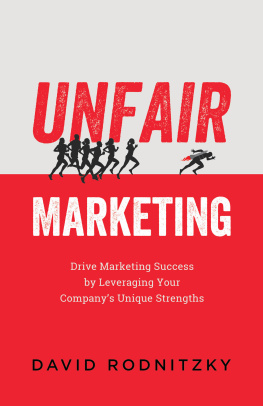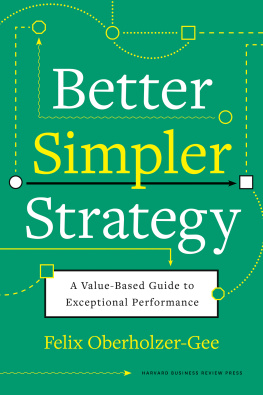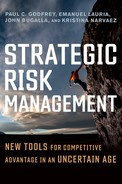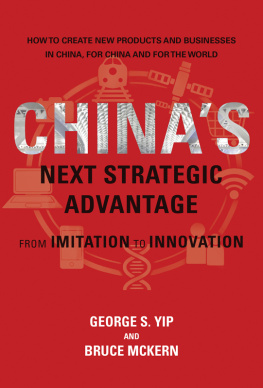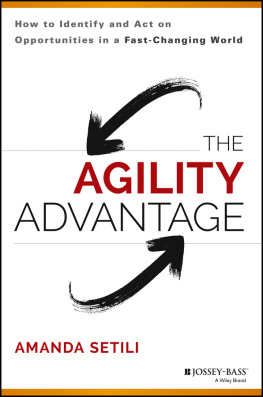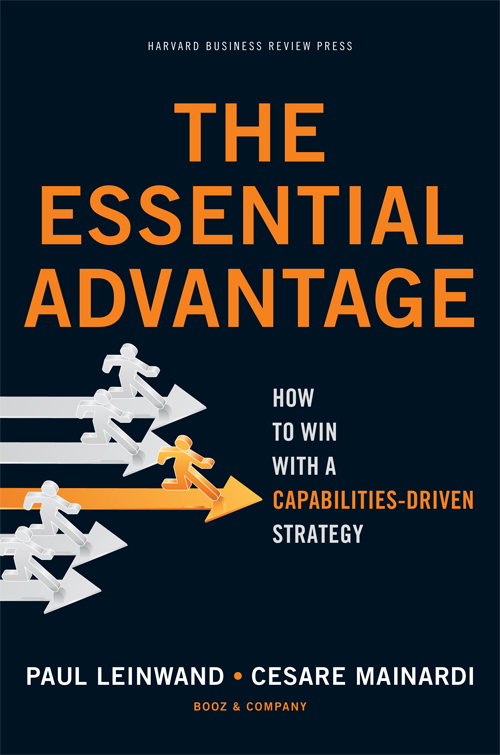Copyright 2011 Booz & Company Inc.
All rights reserved
No part of this publication may be reproduced, stored in or introduced into a retrieval system, or transmitted, in any form, or by any means (electronic, mechanical, photocopying, recording, or otherwise), without the prior permission of the publisher. Requests for permission should be directed to permissions@hbsp.harvard.edu, or mailed to Permissions, Harvard Business School Publishing, 60 Harvard Way, Boston, Massachusetts 02163.
First eBook Edition: December 2010
ISBN: 978-1-4221-3651-5
Praise for The Essential Advantage
Here, at last, is a book that helps a CEO sort through the many conflicting demands on him. Strategic opportunities and distracting temptation often look a lot alike. The framework that intrinsically links capabilities to strategy is clear; it makes sense; its practical; and, I know from experience; it works.
Al Daweesh, Group CEO of Saudi Telecom
Companies have many strategic options, especially in fast-growing markets and industries. The Essential Advantage is a powerful reminder that capabilities should play the central role in sorting through them. Strategy should start with understanding what your company does really welland using that knowledge to generate a corporate direction where you can be confident of winning.
Ahmad Abdulkarim Julfar, Group Chief
Operating Officer, Etisalat Group
This is a powerful book about strategy as choice. It demonstrates that coherencetreating your internal practices and your external business environment as interrelated and mutually focusedleads to competitive advantage. This path is not always easy to follow, but it will resonate at any company that is serious about its future.
Ram Charan, coauthor of The Game Changer
(with A. G. Lafley) and author of
Boards That Deliver
The Essential Advantage provides a pragmatic, holistic, and useful framework for understanding how to deliver performance. This straightforward read provides credible examples and a culmination of considerable thought and experience. There is no reason for competitive disadvantage, other than failing to deliver coherence.
John Hofmeister, former President of
Shell Oil, CEO of Citizens for Affordable Energy, and author of
Why We Hate the Oil Companies
The Essential Advantage picks up where most business books end. Rather than presenting an abstract treatise on capabilities-based strategy, the authors provide deep insights into what a capability is, the value of coherence among activities, and most importantly how executives can earn the right to win in their markets.
Don Sull, Professor of Management Practice in
Strategic and International Management and
Faculty Director of Executive Education at
the London Business School
The Essential Advantage sizzles. It is instantly useful in determining your organizations capabilities and how to make the most of them. Leinward and Mainardi use elegant, easy-to-follow models and compelling company stories to show what works and what doesnt in strategy. Using their exercises and terminology will give your organization a common footing and source of leverage.
Karen Otazo, President, Global Leadership
Network, and author of The Truth
About Being a Leader
Also by Paul Leinwand and Cesare Mainardi
Cut Costs and Grow Stronger: A Strategic Approach to
What to Cut and What to Keep, an e-book
To those who taught us what is essential in life.
To some extent, expressing appreciation to a few individuals who helped with this book misses the point: our perspective on value creation and strategy is derived from at least two generations of Booz & Company consultants who, over time, formed the fundamental ideas behind the capabilities-driven strategy. We especially thank our clients who collaborated with us to discover the essence of advantage. We admire them for their courage in embracing capabilities-driven strategies to boldly transform their companies.
But translating those ideas into this book took great focus and effort, and we must acknowledge those individuals who made it all happen.
Our firms editor-in-chief, Art Kleineran amazing combination of leading business thinker and gifted storytellerwas our close partner throughout the process. It is difficult to properly express our gratitude to him for his vast contributions to this book; we know it certainly would not exist without him.
Our knowledge team at Booz & Company is world-class, and it is this group that energetically brings these concepts to life. Kate Pinkerton, the projects director, identified significant content while managing to organize the entire team to produce two books and a Harvard Business Review article within a year. Tom Stewart, our firms chief knowledge and marketing officer, had insight into how these ideas would make a significant difference in the world of strategic thinking, and we thank him for encouraging and facilitating us. We had a first-class editing team supporting this project: Rob Hertzberg and Tara Owen enhanced the clarity of our ideas and helped us push further with their energy and enthusiasm.
There are so many colleagues at Booz & Company who have contributed to this book. Many of these individuals are highly regarded in their field, and their insights on the topic of strategy have been incredibly helpful. Thank you in particular to Gerald Adolph, DeAnne Aguirre, Jin Ahmed, Shumeet Banerji, Marty Bollinger, Niko Canner, Dave Coleman, Ivan de Souza, Niklas Eidmann, Ken Favaro, Alan Gemes, David Kantor, Per-Ola Karlsson, Jon Katzenbach, Nadia Kubis, Kenny Kurtzman, Steffen Lauster, Dan Lewis, Jack McGrath, Peter Mensing, Jan Miecznikowski, Amit Misra, Lisa Mitchell, Les Moeller, Marcus Morawietz, J. Neely, Gary Nelson, Karim Sabbagh, Samrat Sharma, Kolinjuwa Shriram, Ed Tse, Aurelie Viriot, and Dan West. They all devoted considerable time challenging our ideas, making them better, and helping us to review and improve the manuscript. An expert communications team helped to bring this book to the market; this includes Michael Bulger, Jon Gage, Sharon Harkey, Karen Henrie, Elizabeth Johnson, Frank Lentini, Penny Peters, Alan Shapiro, and Frank Sommerfield.
To our colleagues at Harvard Business Review Press, we learned what it meant to have a value-added publisher, with your unending focus on improving the ideas. Thanks to Paul Michelman and Sarah Cliffe, who saw the potential of this project; to Melinda Merino, Jacque Murphy, Christina Bortz, and Erin Brown; and in particular to Ania Wieckowski, our editor for this book.
Judy Luczak and Debbie Pagewho both would normally be thanked for keeping us organizedprovided so much more support and thus gave us the freedom to think and write.
And most importantly, to our respective families and friends: you were supportive in every possible way. You encouraged us to take on this challenge, you sustained and guided us, and you accepted the time it took away from our personal lives. We return that time to you now, knowing that is what is most essential in life.
Chicago and Cleveland
July 13, 2010
Its 8 a.m. in the executive conference room of a large global manufacturing company. About twenty-five people, most of them heads of businesses or of major functions, are seated around the table. A dozen more leaders are attending by phone, calling in from their respective regions. The occasion is a quarterly review of new growth options, and the head of one of the major business units is making her pitch now. Raised in Delhi, Aadya is a poised, fast-talking, 41-year-old engineer-turned-executive; she has been with the company ten years. Currently based in California, she spent much of this past year in India and other Asian countries, because thats where she believes the best prospects are for growth in their industry.



